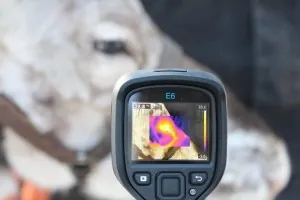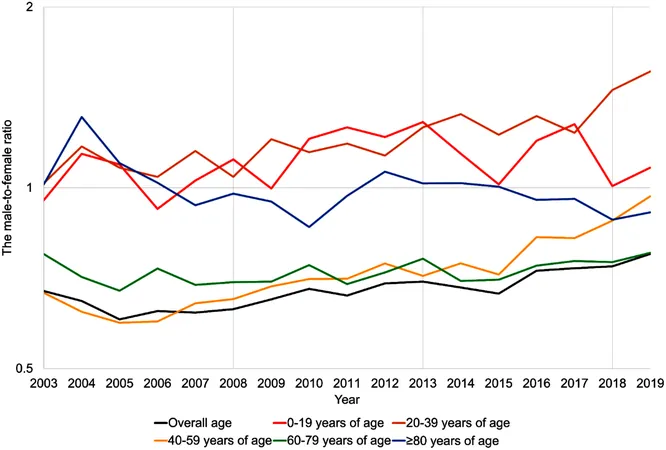
Revolutionary Infrared Thermal Imaging Technology Reveals Hidden Stress in Reindeer!
2024-09-24
Groundbreaking Study by International Collaboration
In a groundbreaking study, an international collaboration between researchers at the University of Turku in Finland and the University of Tours in France has validated the use of infrared thermal imaging as a revolutionary, non-invasive method to assess stress responses in reindeer. This exciting development could significantly enhance the welfare of animals under human care, especially in settings such as tourism.
The Importance of Monitoring Stress in Animals
Why is monitoring stress in animals so crucial? Animals that are under human control experience a range of stresses that can affect their health and well-being. Traditional methods of stress assessment, which often require close contact and handling—like drawing blood or collecting saliva—can inadvertently add to the animals’ stress levels, masking true physiological responses. This is where infrared thermal imaging steps in as a game-changer, allowing researchers to gather vital data from a safe distance.
Physiological Responses to Stress
When reindeer encounter stressors, their bodies respond instinctively, preparing for either flight or fight. This results in changes to blood flow, which can manifest as temperature fluctuations in various body regions. For instance, when blood is redirected to the legs for a potential escape, areas like the nose and eyes may cool down. Researchers discovered that measuring these temperature variations, particularly around the eyes, can be a reliable indicator of stress levels in these animals.
Study Overview and Findings
This innovative study involved eight male sledge reindeer who were accustomed to human presence but not human touch. Researchers observed the animals' reactions when they were petted by an unfamiliar person for one minute. The results were clear: the reindeer showed evident avoidance behaviors, attempting to move away from the human contact, thus confirming that the interaction was indeed a stress-inducing stimulus.
Infrared Thermal Imaging Results
The infrared thermal cameras captured revealing footage that showcased a decrease in the temperature at the corner of the reindeer's eyes during the petting session. Remarkably, the temperature began to rise again once petting ceased, mirroring the stress response cycle.
Expert Insights
Postdoctoral Researcher Océane Liehrmann, the study's lead investigator, noted, “Our findings illustrate that infrared thermal imaging can effectively capture physiological stress responses in reindeer during human interactions. This technology enables us to monitor emotional states without invasive procedures, which is essential for ensuring their welfare.” Docent Martin Seltmann, a co-author of the study, emphasized the broader significance of their findings, saying, “By establishing reliable methods for stress assessment, we can enhance the management and treatment of reindeer in tourism contexts.
Broader Implications of the Research
The results of this research aren't limited to just reindeer; they pave the way for more responsible practices in the welfare assessment of other animal species that interact with humans. The implications of infrared thermal imaging in animal welfare extend further: it's a beacon of hope for promoting humane treatment in tourism and enhancing our understanding of the intricate human-animal relationship.
A Call to Action
This study is a timely reminder of the need to continually adapt our practices towards bettering the lives of the animals we work with and protect. Published in the esteemed *Animal Behavior and Cognition* journal, this research not only sets a new standard for assessing animal stress but also inspires further exploration into the technology's applications across various species involved in human interactions. As we move towards a future of responsible tourism, understanding and monitoring animal welfare has never been more crucial! Stay tuned for more innovative approaches that aim to transform our relationship with the animal kingdom!



 Brasil (PT)
Brasil (PT)
 Canada (EN)
Canada (EN)
 Chile (ES)
Chile (ES)
 España (ES)
España (ES)
 France (FR)
France (FR)
 Hong Kong (EN)
Hong Kong (EN)
 Italia (IT)
Italia (IT)
 日本 (JA)
日本 (JA)
 Magyarország (HU)
Magyarország (HU)
 Norge (NO)
Norge (NO)
 Polska (PL)
Polska (PL)
 Schweiz (DE)
Schweiz (DE)
 Singapore (EN)
Singapore (EN)
 Sverige (SV)
Sverige (SV)
 Suomi (FI)
Suomi (FI)
 Türkiye (TR)
Türkiye (TR)